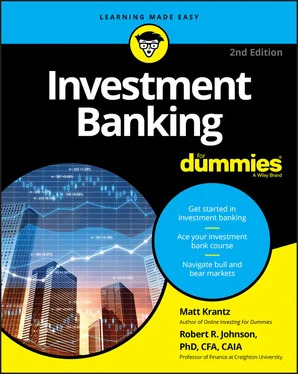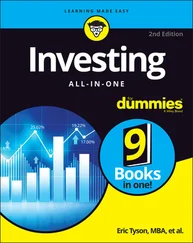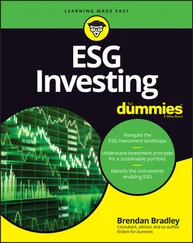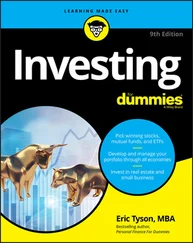 Investment bankers raise money from investors, by selling securities, and then transferring that money to people who need cash to start businesses, build buildings, run cities, or bring other costly projects to reality.
Investment bankers raise money from investors, by selling securities, and then transferring that money to people who need cash to start businesses, build buildings, run cities, or bring other costly projects to reality.
There are many aspects of investment banking that muddy this fundamental purpose. But in the end, investment bankers simply find opportunities to unlock the value of companies or ideas, create businesses, or route money from being idle to having a productive purpose. (In Chapter 2, you discover the purpose of investment banking.)
The role investment banking plays
Investment bankers get involved in the very early stages of funding a new project or endeavor. Investment bankers are typically contacted by people, companies, or governments who need cash to start businesses, expand factories, and build schools or bridges. Representatives from the investment banking operation then find investors or organizations like pension plans, mutual funds, and private investors who have more cash than they know what to do with (a nice problem to have) and who want a return for the use of their funds. Investment banks also offer advice regarding what investment securities should be bought or the ones an investor may want to buy.
 One of the trickiest parts of understanding investment banking is that it’s typically a menu of financial services. Some investment banking operations may offer some services, but not others.
One of the trickiest parts of understanding investment banking is that it’s typically a menu of financial services. Some investment banking operations may offer some services, but not others.
The services offered by investment banks typically fall into one of a few buckets. One of the best ways to understand investment banks is to examine all the functions that some of the biggest investment banks perform. For example, Morgan Stanley, one of the world’s largest investment banks, has its hands in several key business areas, including the following:
Capital raising: This part of the investment banking function helps companies and organizations generate money from investors. This is typically done by selling shares of stock or debt.
Financial advisory: In this role, the investment banking operation is hired to help a company or government make decisions on managing their financial resources. Advice may pertain to whether to buy another company or sell off part of the business. A common business decision tackled by this type of investment banking is whether to acquire another company or divest of a current product line. This is called mergers and acquisitions (M&A) advisory.
Corporate lending: Investment banks typically help companies and other large borrowers sell securities to raise money. But large investment banks are also frequently involved in extending loans to their customers, often short-term loans (called bridge loans ) to tide a company over while another transaction is in the works.
Sales and trading: Investment bankers are a creative and innovative lot, in the business of constructing financial instruments to be bought and sold. It’s natural for investment bankers to also buy and sell stocks and other financial instruments either on the behalf of their clients or using their own money.
Brokerage services: Some investment banking operations include brokerage services where they may hold clients’ assets or help them conduct trades.
Research: Investment banks not only help large institutions sell securities to investors, but also assist investors looking to buy securities. Many investment banks run research units that advise investors on whether they should buy a particular investment. The terms investments and securities are pretty much interchangeable.
Investments: Investment banks typically serve the role of a middleman, sitting between the entities that need money and those that have it. But periodically, units of investment banking operations may invest their own money in promising companies or projects. This type of investment, often made in companies that don’t have investments that the public can buy, is called private equity.
 Investment banking operations at one firm may be engaged in some of the preceding activities, but not all. There’s no rule that demands investment banking operations must perform all the services described here. As investment firms grow, though, they often add functions so they’re more valuable to their clients and can serve as a common source for a variety of services.
Investment banking operations at one firm may be engaged in some of the preceding activities, but not all. There’s no rule that demands investment banking operations must perform all the services described here. As investment firms grow, though, they often add functions so they’re more valuable to their clients and can serve as a common source for a variety of services.
How investment banking differs from traditional banking
The critical part of the investment banking process is in the way cash is funneled from the people who have it to the people who need it. After all, traditional banks do essentially the same thing investment banks do — get cash from people who have excess amounts into the hands of those who have productive uses for it.
Traditional banks take deposits from savers with excess cash and lend the money out to borrowers. The main types of traditional banks are commercial banks (which deal primarily with businesses) and retail banks (which deal mostly with individuals).
The difference between traditional banks and investment banks, though, is the way money is transferred between the people and institutions that need it and the ones who have it. Instead of collecting deposits from savers, as traditional banks do, investment bankers usually rely on selling financial instruments (such as stocks and bonds), in a process called underwriting. By selling financial instruments to investors, the investment bankers raise the money that’s provided to the people, companies, and governments that have productive uses for it.
Because banks accept deposits from Main Street savers, those deposits are protected by the Federal Deposit Insurance Corporation (FDIC), which guarantees bank deposits. To protect itself, the FDIC along with the federal government puts very strict rules on banks to make sure they’re not being reckless.
On the other hand, investment banks, at least until the financial crisis of 2007 (see the appendix), were free to take bigger chances with other people’s money. Investment banks could be more creative in inventing new financial tools, which sometimes don’t work out so well. The idea is that clients of investment banks are more sophisticated and know the risks better than the average person with a bank account.
 The meaning of the term investment bank got even more unclear after the financial crisis that erupted in 2007. Due to a severe shock to the bond market, many of the dedicated investment banks went out of business, including venerable old-line firms such as Lehman Brothers and Bear Stearns, or were bought by banks. Many of today’s largest investment banks are now units of banks or technically considered commercial or retail banks, although they still perform investment banking operations. Meanwhile, these banks will often say they perform investment banking functions. The term investment bank is somewhat of a misnomer, because the major financial institutions are now technically considered banks.
The meaning of the term investment bank got even more unclear after the financial crisis that erupted in 2007. Due to a severe shock to the bond market, many of the dedicated investment banks went out of business, including venerable old-line firms such as Lehman Brothers and Bear Stearns, or were bought by banks. Many of today’s largest investment banks are now units of banks or technically considered commercial or retail banks, although they still perform investment banking operations. Meanwhile, these banks will often say they perform investment banking functions. The term investment bank is somewhat of a misnomer, because the major financial institutions are now technically considered banks.
Now that you see that the chief role of investment banks is selling securities, the next question is: What types of securities do they sell? The primary forms of financial instruments sold by investment banks include the following:
Читать дальше

 Investment bankers raise money from investors, by selling securities, and then transferring that money to people who need cash to start businesses, build buildings, run cities, or bring other costly projects to reality.
Investment bankers raise money from investors, by selling securities, and then transferring that money to people who need cash to start businesses, build buildings, run cities, or bring other costly projects to reality. One of the trickiest parts of understanding investment banking is that it’s typically a menu of financial services. Some investment banking operations may offer some services, but not others.
One of the trickiest parts of understanding investment banking is that it’s typically a menu of financial services. Some investment banking operations may offer some services, but not others.










